Rabbits are cute no doubt but no matter how cute a rabbit might be, you do not want them snooping around in your garden. Rabbits are herbivores and if they get inside your garden, your plants are sure to become their next meal. Now, unless you run a charity for rabbits in your garden, you have to keep the rabbits out.

But how do you keep rabbits out of the garden?
The most common way of keeping rabbits out of the garden is by building a fence. But this is not the only means. There are other non-barrier methods using rabbit repellents include talcum powder, garlic, powdered pepper, and many more.
Of course, these are not the only ways you can keep rabbits out of your garden. In this article, we focus on fencing your garden to keep rabbits out, plants that repel rabbits, and much more.
Table of Contents
Fencing Your Garden Against Rabbits
For many people, the first option is to put a fence around the garden. It makes sense to consider this option because it would not only keep rabbits out but, depending on height, it will keep many other animals out too.
If you are considering building a fence to keep rabbits out, there are some structural features to take note of.
These features include the height of the fence, the material used in making the fence, the design, and the installation of the fence.
You have to build a fence higher than the maximum jump height of a rabbit. The material must be one that cannot be broken down or chewed through by the rabbit.
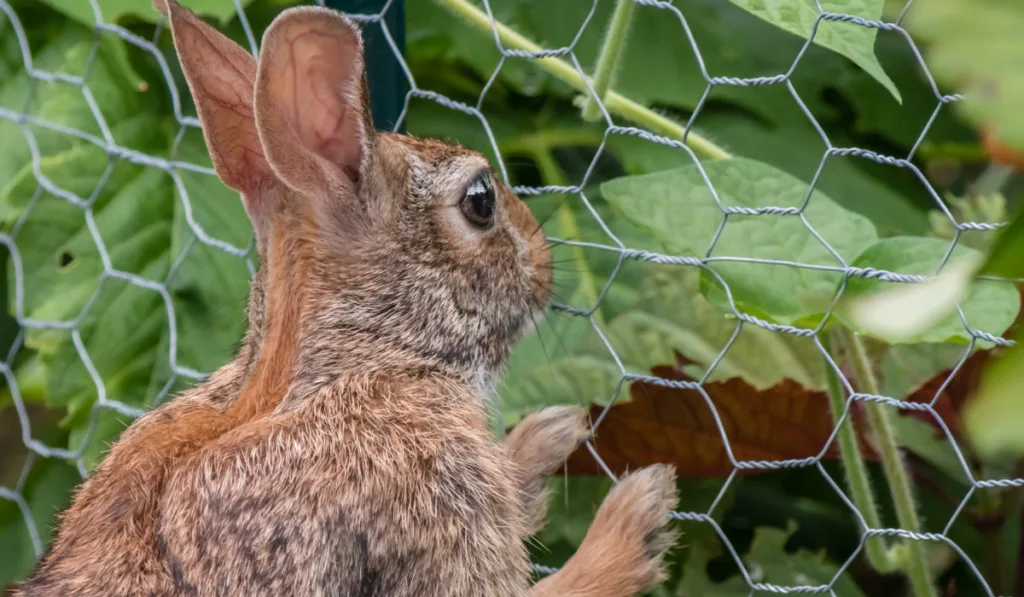
The fence should also be installed in a way that it leaves no space for the rabbits to sneak in.
Let’s take a look at some of these big factors you need to consider.
How High Can Rabbits Jump
You will find variations in the maximum height rabbits can jump. Most rabbits will jump as high as 2 feet. But some breeds can jump as high as 4 feet safely.
Now, these values represent the vertical height to which rabbits will jump. But if you are thinking horizontal height, rabbits can jump as long as 9 – 15 feet horizontally.
What does this mean for your fence? This means you need a fence as high as the maximum jump of a rabbit or higher.
If you are looking to keep rabbits out with a fence, you should consider making it as high as 4 feet or more.
Apart from the height, you should also consider the depth of the base of the fence. Fixing the fence as deep as 6 inches inside the ground is advisable.
If you are using a wire mesh fence, you could bend the base of the fence outwards too. This way the rabbits will be barred from entering the garden even if they try to burrow.
If there’s a mesh in the structure of your fence, you should ensure that the mesh size does not exceed 2 inches. Some rabbits are small enough to fit in through a mesh larger than 2 inches.
The Best Types of Fences for Keeping Rabbits Out
To keep rabbits out, you should consider using either barrier fences, electric fences, or tree guards.
The tree guard option is most suitable when you only want to protect certain plants. They are quite effective for short shrubs, young plants, and tree trunks.
Tree Guards
If you choose to use a tree guard, keep in mind that you can get them as wide as 24 inches. This tree guard should be taller than the plant you intend to use it for.
Install the tree guard around the plant in a way that leaves at least a 2-inch radius between the fence and the plant.
This space will ensure that the rabbit cannot reach the plants from outside the fence. Also, ensure that you bury the base of the fence as deep as 2 – 6 inches to ensure it is sturdy.
Tree guards are commonly made of HDPE, vinyl, aluminum, and treated jute. Any of these types of tree guards will provide enough protection against rabbits.
Electric Fences
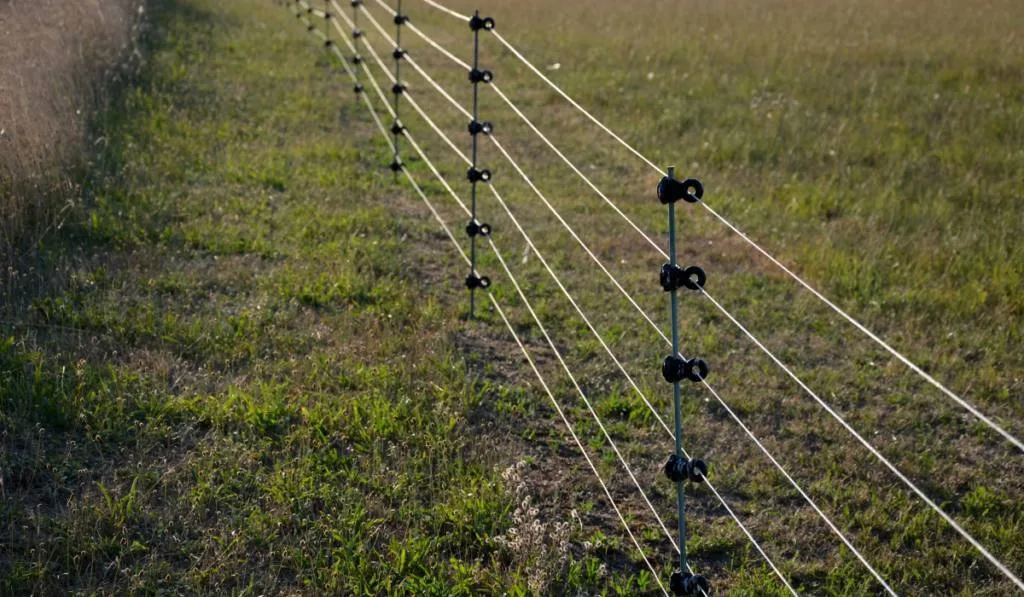
You may also use electric fences to keep rabbits out of your garden. With 8 – 10 lines of electric wires arranged 2 – 3 inches above each other, you can block rabbits from entering your garden.
The advantage of using an electric fence is that you can easily pack it up and store it till when you need it again.
Barrier Fences
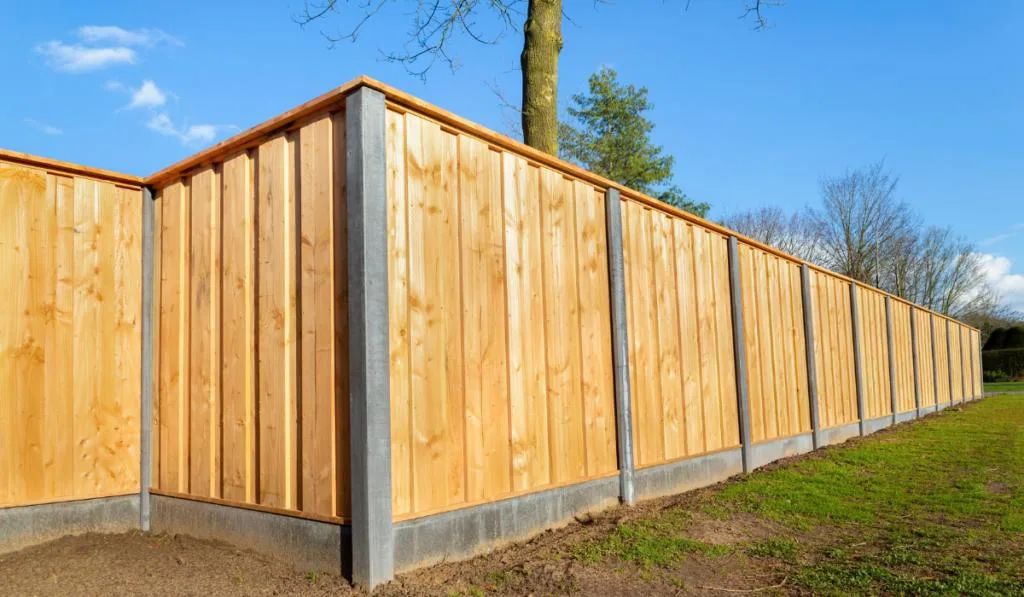
Barrier fences are the most common types of fences. These types of fences can be made of wood, vinyl, steel, or aluminum.
Now, you may want to look away from the wood fences in this case. Rabbits can chew on wood so your wood fence may be of very little use in barring them.
Vinyl, steel, iron, and aluminum fences are better at keeping rabbits out. If you choose to use any of these ensure that the fence is tall enough to serve as a barrier. The jump height of rabbits we discussed earlier would come in handy when deciding the height of your fence.
As stated earlier, you should also consider the mesh size and the depth to which you bury the base of the fence. You don’t want the rabbits burrowing beneath the fence or slipping through the meshes into your garden.
3 Options for Decorative Fencing
Your fence can be effective and visually appealing at the same time. So, if you fancy aesthetics, the following are 3 decorative rabbit fencing you should consider:
Zippity Outdoor Products ZP19001 Madison Vinyl Picket Fence
- DIMENSIONS: Each panel measures 30″H x 56.5″W: Package comes with 2 units for a total of 113 inches of fence
- EASY INSTALL: Assembles and installs with relative ease- no digging required! Simply insert pointed stakes into the ground
- GREEN INITIATIVE: We are proud to announce that our vinyl is made up of recycled PVC that is reprocessed, reinforced, and repurposed, reducing the carbon footprint to then create the cutting-edge designs Zippity Outdoor Products are known for while helping to sustain a greener environment.
This white-colored fence is made of vinyl. It can be installed easily. Since the base has stake-like extensions no digging is required, you only have to push the fence into the ground.
In a pack, you will find 2 pieces that cover a total length of 116 inches. The fence is weather-resistant and should last a while plus they come with a 10-year warranty.
Yaheetech Decorative Garden Fence
- 【Great for Garden】Our decorative garden fence could be set up as barrier for your garden, yard and landscape patio to keep animal away from your flower, plants and vegetable.
- 【Creating Different Shapes】 Panels are connected by metal bars, which allow this garden fence to be flexibly built in different shapes like octagon, square and rectangle in different sizes by adding or removing panels.
This fence comes in various sizes but we’ll advise you to get the 32-inch or 40-inch variant. It is made of metal and is powder-coated so should have a degree of resistance to rust.
It is easy to install and also easy to store. It has a unique design with a mesh size lower than 2 inches, this should provide sufficient protection against rabbits.
Amagabeli Decorative Garden Fence
- HEAVY DUTY & STURDY: This metal garden fence border is tall fencing, each of garden metal fence panel is 44″ high x 36″ wide, 2 panels in total, the whole length is 6 ft long. It is made of thickened iron frame and thick welded wire to be a pretty heavy duty, sturdy and durable iron garden fenc gates, borders for dogs, animal barrier fence for your beautiful garden, yard and patio landscape.
- RUSTPROOF & DECORATIVE:The metal garden fences and borders for dogs is welded with high quality thick metal wire, the surface is treated with baking paint to prevent rust, can resist from bad weather conditions like strong winds or heavy rains. last a long time outdoor. Rustproof and Durable for outdoor using yard garden beds, garden fence border garden edging dog fences animal barrier
This fence is quite sturdy. It is made of wrought iron powder-coated to provide resistance against rust. It comes with easy-to-follow instructions for installation and has an attractive design.
The fence measures about 44 inches in height with a mesh size lower than 2 inches. That’s pretty much what you need to hold a rabbit out of your garden.
Can Rabbits Get Into Raised Beds
If you have a raised-bed garden, you might just be able to deter rabbits without a fence. Can rabbits get into raised beds? The answer to this depends on the height of the beds.
If the height of your beds is 3 feet or higher, it is unlikely that a rabbit would be able to get into any of them unless very determined. With beds as high as that, a fence may not be necessary for your garden.
You could build the border of your raised beds with wood only. Alternatively, you can build the base with wood then add a mesh at the upper part of the bed.
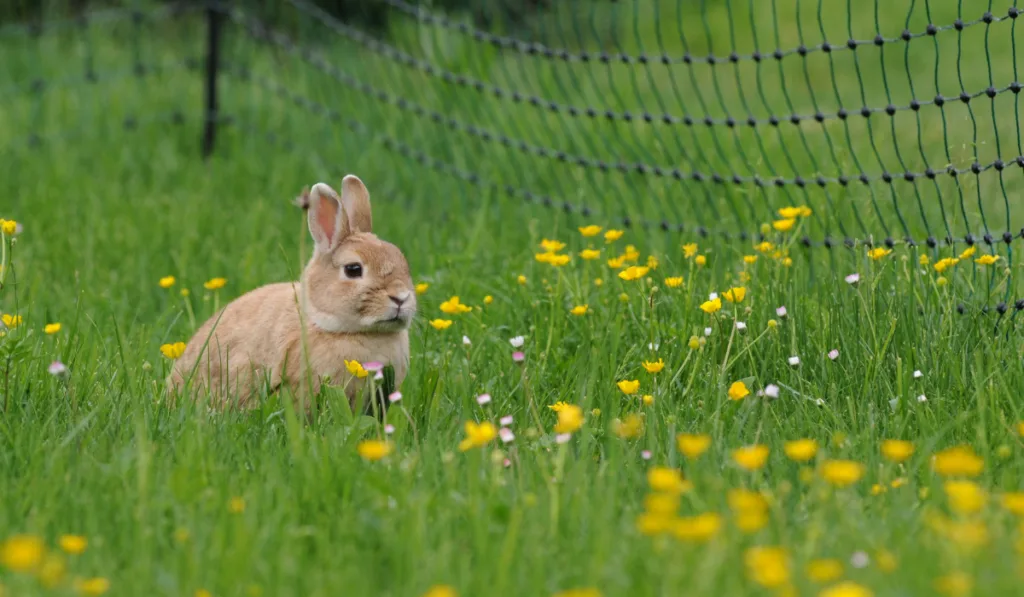
Keeping Rabbits Out Without a Fence
If you are thinking of protecting your garden from rabbits without using a fence, there are some natural repellents you can choose from. Of course, these options do not act as barriers but they can help to an extent.
Natural Repellents
Natural repellents do not act as barriers, rather they act as deterrents to rabbits. Generally, natural repellents are substances that rabbits do not like.
Rabbits might be herbivorous but they do not fancy eating every plant they come across. There are certain plants rabbits will seldom eat. Some of these plants include oregano, begonia, basil, catmint, lavender, and many more.
If you will keep rabbits out without a fence, you can use this disposition against them. If you are unable to sow rabbit-resistant plants, there are many other options that you can naturally use to keep rabbits out of your garden.
Some of these other options include talcum powder and Epsom salt. We shall discuss some substances commonly used as natural repellents below.
Epsom Salt as Rabbit Repellent
Epsom salt is a very good alternative as a natural deterrent for rabbits. The good thing about using Epsom salt is that it offers numerous benefits.
To use Epsom salt as a deterrent, all you need to do is sprinkle some of it on the leaves and other parts of the plants. You may also dilute Epsom salt if you intend to apply it to plants that are sensitive to Epsom salt.
The smell and perhaps the bitter taste of Epsom salt will discourage rabbits from attacking your plants. But there’s more you will get from using Epsom salt in your garden.
Epsom salt is a very good source of magnesium and by using it in your garden, you can improve your overall yield. They can help increase the production of fruits, the growth of foliage, and the quality of fruits & foliage.
To ensure that the effect of Epsom salt is sustained in your garden, you have to replace it regularly. After storms and consistent rainfalls, most of the Epsom salt you have applied would have been washed off. So, you have to ensure that you replace the Epsom salt during these periods.
Do Rabbits Eat Pepper Plants

You may not find success easily if you are trying to find plants rabbits will not eat. Pepper plants may not be top on a rabbit’s list of vegetables. But rabbits will eat the leaves and fruits of pepper plants when they want to or if they have to.
Your pepper plants are at higher risk of being eaten by rabbits when they are younger. But as some species of pepper plants begin to bear pepper fruits, rabbits will eat them less frequently. One group of peppers whose fruits rabbits will avoid are chili peppers. Rabbits will usually avoid chili peppers such as those listed below:
- Jalapeno
- Cayenne
- Habanero
- Scotch Bonnet
The chili pepper variants listed above are very hot and will certainly leave a painful message if rabbits eat them.
Rabbits prefer bell peppers to chili peppers. Some bell peppers they eat are listed below:
- Orange bell peppers
- Red bell peppers
- Green bell peppers
- Yellow bell peppers
Although pepper plants might not be very useful in fending off rabbits, pepper products might be useful.
You can drizzle powdered pepper all over the garden or on plants that the rabbits are likely to attack. The pungent smell of the powder will discourage the rabbits from your garden.
You may also make pepper spray or get one and spray it on your plants. If rabbits try to attack those plants, the pungent smell and the hot taste will be sure to keep them away from your garden.
Does Garlic Repel Rabbits
As we already mentioned earlier, one feature of plant repellents most useful against rabbits is their smell. Everyone knows the spicy odor (not the garlic-breath odor) that comes from garlic. While that spicy odor is desirable to us, rabbits will rather not smell it.
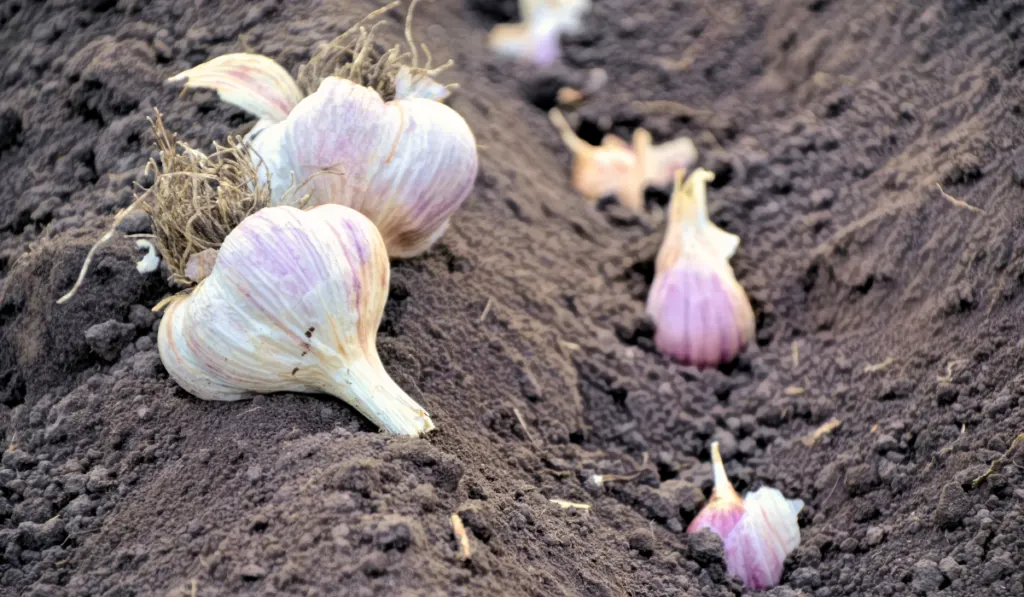
Also, while we may love the taste of garlic, rabbits would rather eat other plants. For these reasons, garlic can offer some help in repelling rabbits.
Onions also offer similar effects against rabbits. To use them as repellents, you may choose to plant garlic or onions around your garden.
You can choose to make them into a spray or powder. If you choose to make a spray out of them, apply the spray to your plants. If you choose to make a powder out of them, you can apply the powder to the soil or the plant.
You may also choose to incorporate them into pepper powder or pepper spray and use them as described above. The extra you get from using garlic is that it can keep other pests such as mosquitoes away.
Other Rabbit Repellents
Substances like mothballs, soap shavings, and even figurines are options that can be used as rabbit repellents. The effectiveness of each of these varies. Let’s take a closer look below, shall we?
Can Mothballs Keep Rabbits Away?
Mothballs are sometimes used in gardens to deter rabbits and other rodents. The issue with this is that most times it is not effective.
Apart from not always being effective, mothballs are illegal in some areas. Also, they pose serious health hazards to you, your children, and your pets.
The content of mothballs can be absorbed into the soil or the plants in your gardens. If such plants are consumed, they can cause nerve issues, hemolytic anemia, and even cancer.
In fewer words, you are better off without mothballs in your garden. They are not very likely to keep rabbits out and they could harm you.
Does Marigold Keep Rabbits Away?

One thing common to plants that can repel rabbits is a strong smell. Marigold is one plant that has a strong smell and for this, it is thought to keep rabbits away. But the truth is marigold will most likely not keep rabbits away.
Rabbits will usually avoid marigold but in certain cases, when there is nothing else for them to eat, rabbits will eat marigold. So, if you are planning to deter rabbits with marigold, know that it may not always be effective. Truth is, you may just be feeding them.
Can Garden Gnomes Keep Rabbit Away?

Garden gnomes might be effective in helping you keep the rabbits away. You can get gnomes of animals that prey on rabbits. Gnomes of animals such as owls, eagles, and snakes can send a message to rabbits to stay off.
If you are going to get gnomes for your garden, one tactic you can employ is to move the gnomes around from time to time. By doing this, you mimic movement and the rabbit may just be convinced.
Garden gnomes are not absolutely effective. Sometimes they won’t work and you may have to go for an alternative.
If you do not find success with garden gnomes, you can adopt other scare tactics. Some of these tactics include placing the fur, blood, or urine of rabbit predators around your garden. The sight or scent of these items can scare them away.
21 Plants Rabbits Like to Eat
- Broccoli
- Carrot
- Spinach
- Tulip
- Apple
- Hydrangea
- Maple
- Beans
- Lettuce
- Parsley
- Sunflower
- Lilies
- Iris
- Daisy
- Hawthorn
- Rose
- Witch Hazel
- Strawberry
- Kiwi
- Raspberry
- Grapes
15 Plants Rabbits Do Not Like to Eat
- Onions
- Garlic
- Tomatoes
- Catmint
- Lavender
- Oregano
- Begonia
- Marigold
- Poppy
- Spruce
- Artichoke
- Black walnut
- Foxglove
- Basil
- Corn
While there are other methods you can employ to keep rabbits out of your garden, none of them is as effective as building a fence. Rabbits can always find a way around these other repellents. But if you have a fence with the right specification, the chances of a rabbit getting past it are very slim.
Resources
- https://www.rabbitcaretips.com/can-rabbits-jump-from-high-places/
- https://petsmentor.com/rabbits/rabbit-jumping-and-how-high-can-rabbits-jump/
- https://oldworldgardenfarms.com/2018/03/18/keeping-rabbits-out/#
- https://www.thespruce.com/rabbit-proof-plants-1402145
- https://thethriftycouple.com/17-incredible-reasons-to-use-epsom-salt-in-the-garden-for-results-that-will-amaze-plus-the-methods-of-proper-application/
- https://hubpages.com/living/Keeping-Groundhogs-and-Rabbits-out-of-your-garden
- http://greenthumbalina.com/blog-gardening-tips-and-tricks/2018/1/31/how-to-keep-animals-out-of-raised-garden-beds#
- https://www.finegardening.com/article/keeping-rabbits-out-of-the-kitchen-garden
- https://www.almanac.com/pest/rabbits
- https://www.smilinggardener.com/organic-pest-control/how-to-keep-rabbits-out-of-the-garden/
- https://homeguides.sfgate.com/garlic-plants-rabbit-control-41675.html
- https://www.thespruce.com/plants-that-rabbits-eat-at-risk-3976755

Emma
Thursday 14th of October 2021
hello when was this website made i need to site my soucre in english